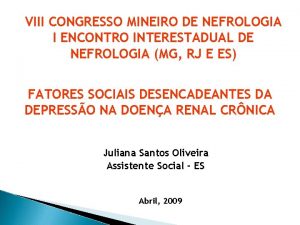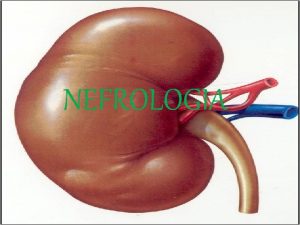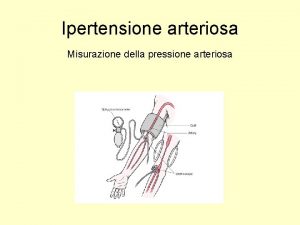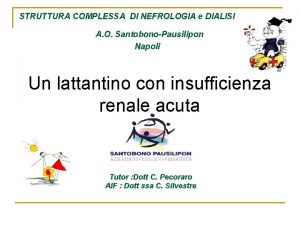U O C di Nefrologia Dialisi ed Ipertensione














- Slides: 14

U. O. C. di Nefrologia, Dialisi ed Ipertensione Policlinico S. Orsola-Malpighi Azienda Ospedaliero-Universitaria Bologna - ITALY Gender and Renal diseases Marcora Mandreoli Antonio Santoro

Impact of gender on the incidence and progression rate of Chronic Kidney Disease (CKD) - The incidence of CKD is major in man than in women - Renal disease in women with polycystic kidney disease, Ig. A nephropathy, membranous glomerulopathy, and ‘chronic renal disease of unknown aetiology’ progresses at a slower rate than it does in blood pressure- and lipid levels-matched men with these diseases - CKD patients behave differently from the general population, lacking a female survival advantage during renal replacement therapy. J Neugarten. J Am Soc Nephrol 11: 319, 2000

maschi Neugarten J. JASN 2000; 11: 319

Cumulative Incidence of End Stage Renal Disease USRDS 2007

Numerous studies have indicated that sex hormones affect Mammalian kidneys, causing sexual dimorphism in a variety of morphological and/or functional properties Both α- and β-estrogen receptors (ERα and ERβ) have been detected in the kidney, and specifically in mesangial cells. Studies in vascular tissue, studies of cultured male renal mesangial cells have shown that estradiol suppresses collagen synthesis and stimulates metalloproteinase activity via activation of estrogen receptors

Effects of sex hormones Haemodinamic pathway Silbiger SR Kidney International (2011) 79, 382– 384

Gender-dependent effects of aging on the kidney - + A. L. Gava, et al. Braz J Med Biol Res 2011; 44: 905 -913

Cumulative survival of women and men with or without Diabetes 5 years after the start of dialysis F Without T 2 DM M M F with T 2 DM Carrero J J et al. Nephrol. Dial. Transplant. 2011; 26: 270 -276

Hypothesis " Reduced levels of estrogen and imbalance in the expression of estrogen receptors is one of the contributing mechanisms for the loss of the female sex as a protective factor in diabetes " Estrogen is renoprotective by attenuating the decline in renal function and preventing renal pathology associated with diabetic nephropathy

Estrogen receptors in the kidney

Estrogen attenuates renal structural damage in diabetic nephropathy

Estrogen attenuates the decline in renal function in diabetic nephropathy

How sex steroid may modulate renal injury Sex Steroid Effects Mechanisms Estradiol Progesterone Testosterone/DHT Renal Ang II decrease ? increase downregulate ? no effect probably decrease ? increase ? antioxidant pro-oxidant Acute vasodilator Chronic vasodilator vasoconstrictor ? increase AT 1 receptors Endothelin Oxidative stress Vascular effect Sodium reabsorption

Conclusions Scant attention is currently paid to the important biological and psychological differences between men and women with CKD There is a scarcity of information about the role of menopause in modifying risk profiling and the involvement of sex hormones in the disease Sex hormones still have a role after menopause and sex specific tissue responses and cellular differences also exist Females develop less age-dependent loss of renal function, in part because of cardiorenal protective effects of estrogens, but estrogen acts via multiple pathways, not all of which are beneficial for renal function The true role of sex hormones in conditioning the CKD progression is not completely clear: most probably they don’t have a direct causal role, but they act as permissive factors.
 Erc colombia
Erc colombia Nefrologia
Nefrologia Congresso mineiro de nefrologia
Congresso mineiro de nefrologia Gesf colapsante
Gesf colapsante Postura decerebrata
Postura decerebrata Ipertensione endocranica
Ipertensione endocranica Ipertensione nefroparenchimale
Ipertensione nefroparenchimale Diagnosi infermieristiche ipertensione
Diagnosi infermieristiche ipertensione Varici esofagee classificazione
Varici esofagee classificazione Esercizio fisico ipertensione arteriosa polmonare
Esercizio fisico ipertensione arteriosa polmonare Hvpg valori
Hvpg valori Anidrasi carbonica
Anidrasi carbonica Curva j ipertensione
Curva j ipertensione Lussazione del cristallino
Lussazione del cristallino Hfr dialisi
Hfr dialisi


























